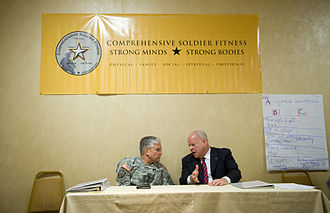- Martin Seligman
-
Martin E. P. Seligman (né le 12 août 1942) est un psychologue américain, auteur de livres de développement personnel. Sa théorie sur l’impuissance apprise a largement été adoptée par la communauté scientifique[1].
Selon l’étude de Haggbloom et al sur les 100 psychologues les plus éminents du XXe siècle, seligman est le 13e nom le plus cité dans les livres d’initiation à la psychologie et le 31e le plus éminent toutes catégories confondues[2]. Seligman a été élu Président de l’American Psychological Association en 1998[3].
Selon l’écrivain Jane Mayer[4], Seligman donna une conférence au sein du programme SERE de la US Navy en 2002 sur les moyens pour les soldats de résister à la torture basés sur sa compréhension de l’impuissance apprise. Cette conférence serait en partie à l'origine du développement au sein de SERE des techniques d'interrogatoire renforcées utilisées lors de la guerre contre le terrorisme de Georges W. Bush[5].
Seligman travailla également avec Christopher Peterson à la création du pendant « positif » au Manuel diagnostique et statistique des troubles mentaux (DSM-I à V), ce dernier se concentrant sur « ce qui va mal ». Leur étude conclut, entre autres, qu’il existe des valeurs millénaires dans toutes les traditions du monde. Leur liste en inclut six : sagesse/connaissance; courage; humanité; justice; tempérance; transcendance, chacune comprenant des sous-groupes, par exemple la tempérance inclut le pardon, l’humilité, la prudence, et l’autorégulation[6].
Bibliographie
- Seligman, Martin E. P. (1975). Helplessness: On Depression, Development, and Death. San Francisco: W.H. Freeman. ISBN 0-7167-0752-7 (Paperback reprint edition, W.H. Freeman, 1992, ISBN 0-7167-2328-X)
- Seligman, Martin E. P. (1991). Learned Optimism: How to Change Your Mind and Your Life. New York: Knopf. ISBN 0-671-01911-2 (Paperback reprint edition, Penguin Books, 1998; reissue edition, Free Press, 1998)
- Seligman, Martin E. P. (1993). What You Can Change and What You Can't: The Complete Guide to Successful Self-Improvement. New York: Knopf. ISBN 0-679-41024-4 (Paperback reprint edition, Ballantine Books, 1995, ISBN 0-449-90971-9)
- Seligman, Martin E. P. (1996). The Optimistic Child: Proven Program to Safeguard Children from Depression & Build Lifelong Resilience. New York: Houghton Mifflin. (Paperback edition, Harper Paperbacks, 1996, ISBN 0-06-097709-4)
- Seligman, Martin E. P. (2002). Authentic Happiness: Using the New Positive Psychology to Realize Your Potential for Lasting Fulfillment. New York: Free Press. ISBN 0-7432-2297-0 (Paperback edition, Free Press, 2004, ISBN 0-7432-2298-9)
- Seligman, Martin E. P. (2004). '"Can Happiness be Taught?". Daedalus, Spring 2004.
- Peterson, Christopher, & Seligman, Martin E. P. (2004). Character Strengths and Virtues. Oxford: Oxford University Press. (ISBN 0-19-516701-5)
En français :
- Seligman, Martin, La force de l'optimisme, Interéditions, 2008, ISBN 978-2-7296-0937-5
- Seligman, Martin, Changer, oui, c'est possible, Éditions de l'Homme, 1999, ISBN 978-2-7619-1267-9
Références
- (en) Gordon H. Bower, The psychology of learning and motivation: advances in research and theory, Academic Press, Harcourt Brace Jovanovich, 1981 [lire en ligne (page consultée le 2010-02-05)], p. 30 "The most popular theoretical interpretation of the learned helplessness phenomenon to date is that of Seligman (1975) and Maier and Seligman (1976)."
- Haggbloom, S.J. et al. (2002). The 100 Most Eminent Psychologists of the 20th Century. Review of General Psychology. Vol. 6, No. 2, 139–15.
- List of APA Presidents
- Scott Horton, « Six Questions for Jane Mayer, Author of The Dark Side », Harper's Magazine, 2008-07-14. Consulté le 2009-02-04
- AMY GOODMAN / Jane Mayer, « The Dark Side: Jane Mayer on the Inside Story of How the War on Terror Turned Into a War on American Ideals » sur democracynow.org. Consulté le 4 mars 2011
- Linley, P. A., Maltby, J., Wood, A. M., Joseph, S., Harrington, S., Peterson, C., Park, N., Seligman, M. E. P. (2007). Character strengths in the United Kingdom: The VIA Inventory of strengths Personality and Individual Differences, 43, 341-351.
- (en) Cet article est partiellement ou en totalité issu de l’article de Wikipédia en anglais intitulé « Martin Seligman » (voir la liste des auteurs)
Liens externes
Wikimedia Foundation. 2010.

